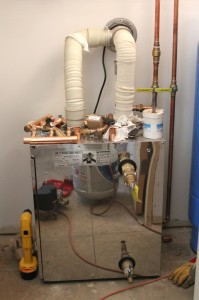 If you’re thinking about replacing your heating system, here are some questions to ask yourself. A “yes” to any of them may warrant a call to an energy rater or heating contractor.
If you’re thinking about replacing your heating system, here are some questions to ask yourself. A “yes” to any of them may warrant a call to an energy rater or heating contractor.
Have you recently upgraded the thermal envelope of your house?
The thermal envelope of your house is everything that separates the living space from the outside, including walls, doors, windows, insulation and the roof. If you’ve been sealing leaks, eliminating drafts, replacing old windows with double-pane or triple-pane models, or adding insulation, you’ve been making your home more energy efficient.
With thermal envelope upgrades, the home will lose less heat in the winter, and therefore it’s likely the heating appliance won’t need to provide as much energy. Depending on the reduction in energy use, it is entirely possible that your heating appliance could be come oversized, and a smaller system may operate more efficiently
Is your current heating appliance more than 20 years old?
Technology marches on. Appliances made today are far more efficient than older models. Not only do they use less fuel, they are also safer and come with more advanced controls to improve efficiency. Also, the methods to size a heating system are better and can be tailored to individual homes.
Is your house uncomfortable?
Do you have rooms that are always too hot or too cold? This can be the result of air leaks, inadequate insulation, an improperly sized heating appliance, or lack of zoning in your heating system. Start with a call to an energy rater to find out which improvements you can make to solve this problem. If you need to add insulation or seal leaks, take care of that before upgrading your heating system so that the heating system will be sized properly for your home.
Who to call?
Energy raters will examine your entire house, measuring doors and windows, checking insulation levels, assessing your heating system and testing air leakage rates. The rater will input the data collected from the home inspection into AKWarm — a software program maintained by the Alaska Housing Finance Corporation. The AKWarm program is then able to calculate a home’s theoretical energy requirements, which it prints out as part of an energy rating certificate. This rating describes how efficient different components of your home are on a point scale. Included in the rating are suggestions to improve performance, which may or may not include the heating system. The rating will help prioritize upgrades, show the energy benefits of each one and may qualify you for the Alaska Home Energy Rebate Program.
Heating contractors will focus specifically on your heating system, evaluating its current efficiency and whether it is sized properly. A contractor can sometimes test for the efficiency of the distribution system (depending on the type). The contractor will provide you with information on improving your current system and purchasing new appliances.